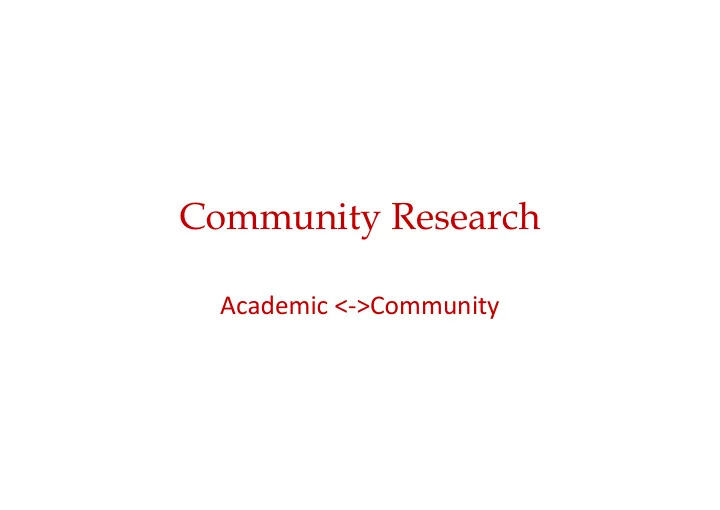

Community Research Academic <->Community
Pasifika Trivia 1. There are 3 sub regions in the Pacific. Polynesia and Melanesia are 2 of them. What is the 3 rd sub-region? 2. What is the Pacific country closest to New Zealand? 3. Which Pacific nation is known as ‘the Rock’? 4. What is the Māori name for the Pacific Ocean? 5. Which Pacific peoples are NZ citizens by right? 6. Each year, the citizens of five Pacific countries can apply for the Pacific Quota ballot for NZ residence. Name the five countries. 7. What is referred to as ‘black Saturday’ in Samoa? 8. Pacific playwright Oscar Kightley started writing in Christchurch for which theatre company? 9. Which is the fastest growing Pacific ethnicity in NZ? 10. What was the name of the NZ Prime Minister responsible for Dawn Raids? Hand in answer sheets
Ako Aotearoa Project: Three Phases of this research journey Project 1: Pilot study (2013) – an idea, lots of talk – lets test Project 2: Main study and Report - Change strategies to enhance Pasifika student success at Canterbury tertiary organisations (2015) Recent Project: completed March 2018 – Pasifika Resource Kit implementation and evaluation
Student Video https://www.youtube.com/watch?v=CfUE4X0GeI8
Recommended transformative change strategies 1. Academic space – increase contextual relevance to Pasifika learners 2. Student services - Improve Student Services to Pasifika 3. Pasifika visibility - Increase Pasifika visibility and Pasifika spaces
Pasifika Resource Kit Pasifika student voices on success Pasifika Success Indicators (PSI) A cultural frame, ‘Fausiga o le fale tele’ A tool measuring Pasifika success within courses Exemplars of best practice Complementary work book Staff videos & moodle site development
Recommended transformative change strategies 1. Academic space – increase contextual relevance to Pasifika learners 2. Student services - Improve Student Services to Pasifika 3. Pasifika visibility - Increase Pasifika visibility and Pasifika spaces
Some handy hints The culture of the young person cannot enter the classroom unless it is first in the consciousness' of the teacher (ANON) • Get to know the student-leads to better understanding • Make an effort to pronounce their names properly. • Genuine warm relationships –key! Give a little of yourself • Have a sense of humour –a smile goes along way • Don’t lump us all together –consider that although there are many commonalities there are also significant differences • Talking about ‘self’ or self promotion is considered arrogant. • Make no assumptions –Pasifika complex • Don’t assume we all know our own language history or culture • Don’t assume you know more than you do
• Interactive and practical examples relevant to Pasifika perspectives often preferred such as group work, case studies, • Things such as critical thinking, individualism, studying alone for long periods are not things we have been encouraged in • Asking questions of elders and those in authority can be considered disrespectful, cheeky or incompetent. • Break down concepts at an acceptable pace especially when they are not part of my worldview. • English as a second language requires more time! • When we ask for explanations please show us what you mean instead of referring us to a text book. • Have an open door policy for student guidance and clarification. They don’t care how much you know, Until they know how much you care (Zig Zigary)
Belonging... ` “I am not an individual; I am an integral part of the cosmos. I share divinity with my ancestors, the land, the seas and the skies. I am not an individual, because I share my tofi (an inheritance) with my family, my village and my nation. I belong to my family and my family belongs to me. I belong to my village and my village belongs to me. I belong to my nation and my nation belongs to me. This is the essence of my belonging” Tui Atua Tamasese (1995 cited in ‘ le Taeao Afua Report’ 2009: 80)
Recommend
More recommend